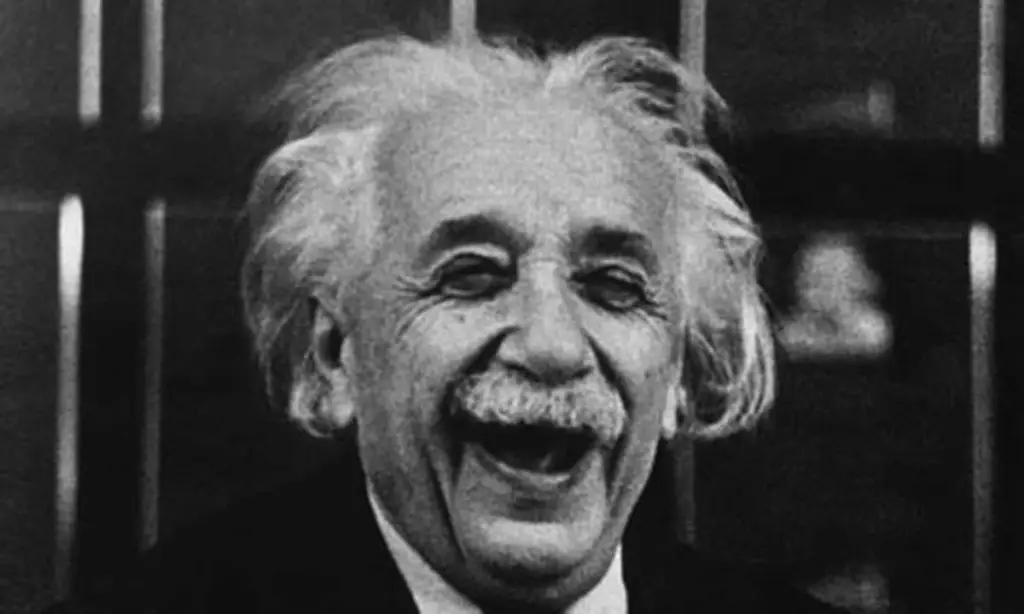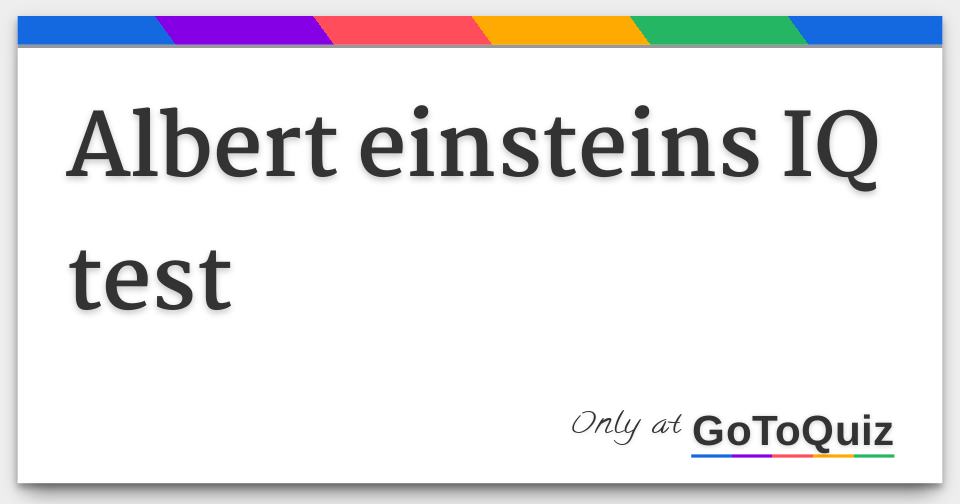Discover The Brilliant Mind: Albert Einstein's IQ
Albert Einstein's IQ has always been a topic of fascination and intrigue among scientists, historians, and the general public alike. The name Einstein is synonymous with genius, and his intellectual prowess continues to inspire generations. In this article, we will explore the brilliance of Albert Einstein's IQ, uncovering the mysteries behind his extraordinary mind and achievements.
Einstein's contributions to science have left an indelible mark on the world. His groundbreaking theories and discoveries continue to shape modern physics. Beyond his scientific achievements, his intellectual capacity has become a benchmark for human intelligence. Understanding the nuances of his IQ sheds light on what made him so extraordinary.
This article aims to provide an in-depth exploration of Albert Einstein's IQ, examining its origins, significance, and impact on his life and work. By the end of this article, you will gain a comprehensive understanding of the brilliance behind one of history's most celebrated minds.
- Hudhub4u Your Ultimate Guide To Understanding And Maximizing Its Benefits
- Discover The Ultimate Movie Experience With Movies4u Hd
Table of Contents
- Biography of Albert Einstein
- Understanding IQ Measurement
- Albert Einstein's IQ
- Traits of a Genius
- Scientific Contributions
- Impact on Modern Science
- Common Myths About Einstein
- Historical Context of Einstein's Time
- Einstein's Legacy
- Conclusion
Biography of Albert Einstein
Early Life and Education
Albert Einstein was born on March 14, 1879, in Ulm, Germany, into a family of Jewish heritage. His early life was marked by a keen curiosity and an aptitude for mathematics and physics. Despite initial concerns about his speech development, Einstein displayed an extraordinary ability to grasp complex concepts from a young age.
Data and Facts About Albert Einstein
| Full Name | Albert Einstein |
|---|---|
| Date of Birth | March 14, 1879 |
| Place of Birth | Ulm, Germany |
| Field of Work | Theoretical Physics |
| Major Contributions | General Theory of Relativity, Photoelectric Effect |
Einstein's educational journey took him to institutions such as the Swiss Federal Polytechnic in Zurich, where he developed a deeper understanding of theoretical physics. His early education laid the foundation for his later achievements, which would revolutionize the field of science.
Understanding IQ Measurement
IQ, or Intelligence Quotient, is a standardized measure of cognitive abilities. It assesses various aspects of intelligence, including problem-solving skills, logical reasoning, and memory. The concept of IQ was developed in the early 20th century and has since become a widely used tool for evaluating intellectual capacity.
- Movierulz 2025 Download Your Ultimate Guide To Safe And Legal Movie Downloads
- Unleashing The Power Of Ullu Video Your Ultimate Guide To Indias Hottest Streaming Platform
Types of IQ Tests
- Stanford-Binet Intelligence Scale
- Wechsler Adult Intelligence Scale (WAIS)
- Raven's Progressive Matrices
Each type of IQ test focuses on different aspects of intelligence, providing a comprehensive evaluation of an individual's cognitive abilities. These tests have evolved over time to ensure accuracy and reliability in measuring intelligence.
Albert Einstein's IQ
While there is no definitive record of Albert Einstein's IQ, estimates place it between 160 and 180. Such a high IQ reflects his exceptional intellectual capabilities and his ability to think outside the box. Einstein's genius was not just about his IQ but also his unique way of approaching problems and finding innovative solutions.
Factors Contributing to Einstein's High IQ
- Strong analytical skills
- Exceptional creativity
- Deep curiosity and passion for learning
Einstein's IQ was a testament to his extraordinary mind, which allowed him to make groundbreaking discoveries in the field of physics. His ability to think abstractly and conceptually set him apart from his peers.
Traits of a Genius
Genius is often associated with certain traits that set individuals apart from the rest. These traits include creativity, perseverance, and a relentless pursuit of knowledge. Albert Einstein exemplified these qualities throughout his life, making him one of history's most celebrated geniuses.
Key Characteristics of Genius
- Unwavering curiosity
- Ability to think abstractly
- Passion for discovery
Einstein's genius was not limited to his intellectual capacity but also his ability to inspire others. His work continues to influence scientists and thinkers worldwide, proving that genius transcends time and space.
Scientific Contributions
Albert Einstein's contributions to science are vast and varied. His most famous work, the theory of relativity, fundamentally changed our understanding of space, time, and gravity. Additionally, his work on the photoelectric effect earned him the Nobel Prize in Physics in 1921.
Major Discoveries
- Special Theory of Relativity (E=mc²)
- General Theory of Relativity
- Brownian Motion
Einstein's discoveries have had a lasting impact on the field of physics, paving the way for future advancements and innovations. His work continues to inspire scientists and researchers to push the boundaries of human knowledge.
Impact on Modern Science
The impact of Albert Einstein's work on modern science cannot be overstated. His theories and discoveries have shaped the way we understand the universe and have led to numerous technological advancements. From GPS systems to nuclear energy, Einstein's contributions continue to influence our daily lives.
Applications of Einstein's Theories
- GPS Technology
- Nuclear Power
- Space Exploration
Einstein's work has not only advanced scientific knowledge but has also had practical applications that benefit society. His theories continue to be studied and applied in various fields, demonstrating their relevance and importance.
Common Myths About Einstein
Despite his fame and influence, there are several myths surrounding Albert Einstein. These myths often overshadow the truth about his life and work, leading to misconceptions about his genius. Separating fact from fiction is essential to understanding the real Einstein.
Debunking Myths
- Einstein failed math in school
- Einstein was a poor student
- Einstein was only interested in theoretical physics
By dispelling these myths, we gain a clearer picture of Einstein's life and achievements. Understanding the truth about Einstein allows us to appreciate his genius fully and recognize his contributions to science and humanity.
Historical Context of Einstein's Time
Einstein's life and work were shaped by the historical context of his time. The early 20th century was a period of rapid scientific advancement and political upheaval. Einstein's theories emerged during a time when the world was on the brink of significant change, making his contributions all the more remarkable.
Influences on Einstein's Work
- World War I and II
- Rise of quantum mechanics
- Advancements in technology
Einstein's work was influenced by the events and discoveries of his era, which provided a fertile ground for innovation and exploration. His theories and discoveries were products of their time, reflecting the challenges and opportunities of the early 20th century.
Einstein's Legacy
Albert Einstein's legacy extends far beyond his scientific achievements. He remains a symbol of intellectual excellence and a champion for peace and social justice. His work continues to inspire scientists, thinkers, and dreamers around the world.
Continuing Influence
- Inspiration for future generations
- Advancements in science and technology
- Advocacy for global peace
Einstein's legacy is a testament to the power of human intellect and the potential for positive change. His life and work remind us of the importance of curiosity, creativity, and perseverance in the pursuit of knowledge.
Conclusion
Albert Einstein's IQ and genius have left an indelible mark on the world. His contributions to science and humanity continue to inspire and influence generations. By exploring the brilliance of his mind, we gain a deeper appreciation for the impact of his work on modern science and society.
We invite you to share your thoughts and insights in the comments below. Engage with our community and explore other articles that delve into the lives and works of history's greatest minds. Together, let's continue to discover the brilliance that shapes our world.
For further reading, we recommend the following sources:
- Isaacson, Walter. "Einstein: His Life and Universe." Simon & Schuster, 2007.
- Calaprice, Alice. "The Quotable Einstein." Princeton University Press, 2018.



Detail Author:
- Name : Meaghan Hudson Sr.
- Username : mckenzie.baylee
- Email : afarrell@gmail.com
- Birthdate : 1975-01-18
- Address : 889 Rath Views East Claire, IN 29788-2889
- Phone : (912) 413-8488
- Company : Predovic, Brakus and Hodkiewicz
- Job : Art Director
- Bio : Facere totam facere enim dolorem ut maxime eveniet. Vero et voluptas sunt est. Qui dolor sed culpa consequatur eos quia sunt. Tempore consequatur velit rerum ut quasi voluptas ut ut.
Socials
facebook:
- url : https://facebook.com/ernestina_dev
- username : ernestina_dev
- bio : Omnis rerum nihil rerum earum exercitationem quia.
- followers : 5758
- following : 1770
tiktok:
- url : https://tiktok.com/@ernestinaswift
- username : ernestinaswift
- bio : Nobis illum voluptatem consequuntur id facere laboriosam.
- followers : 4620
- following : 965
linkedin:
- url : https://linkedin.com/in/swifte
- username : swifte
- bio : Maiores consequatur natus molestiae.
- followers : 921
- following : 171
twitter:
- url : https://twitter.com/ernestina.swift
- username : ernestina.swift
- bio : Eos in dolores quod sapiente. Unde reiciendis dolor aut odit. Laborum consectetur rerum ex corrupti molestias iure. Ipsa facere quia voluptatem.
- followers : 5819
- following : 2901